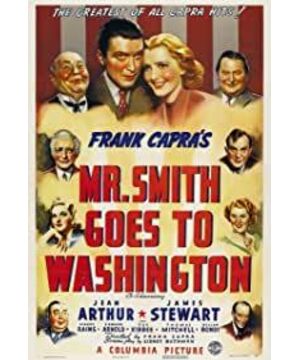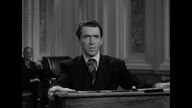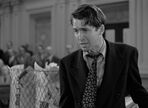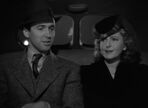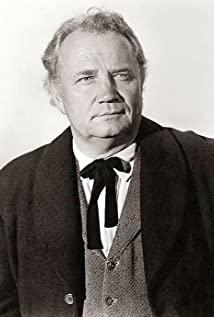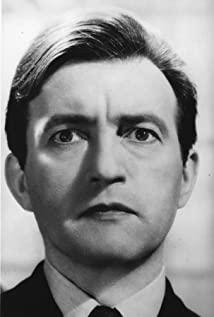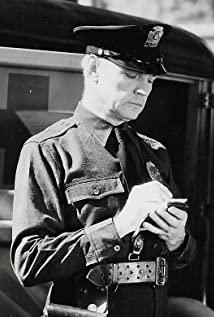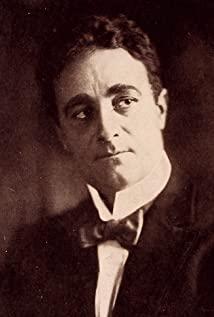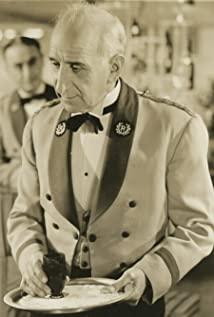This clip revealed Smith as a member of the Washington Senate. The prologue. The young people in the small town suddenly appeared in front of a group of experienced politicians, like an ugly duckling walking into a group of white swans, looking out of place. The reporters mocked him and mocked him, thinking that he was just another political puppet. Facing the reporter's malicious taunts, Smith suddenly fell silent. This is the first time I realized how competent James Stewart is for this role. He lowered his eyes, and the audience could no longer see the always sincere and childish gaze. A strand of black hair was scattered on his forehead, and his always energetic face looked a little wilting at the moment. The beautiful female assistant Sanders was the first person to really know him and affirm him with an open heart. With the help of Sanders, he quickly cheered up and announced a proposal to build a national children's camp at the source of Willie Creek in Terry Canyon. Unexpectedly, this proposal happened to hinder the dam proposal planned by Paine and the big entrepreneur Taylor and his team. They feared that Smith would eventually expose their bribery scandal, and they did not hesitate to forge evidence to blame Smith, ruin his political future and force him to return to his hometown. .
When Paine had a second long conversation with Smith in the office, I was shaken. That's right, although Smith's perseverance is noble, political games cannot be played with nobleness alone. Paine makes compromises when necessary in exchange for more opportunities to benefit those in need. Isn’t this another kind of persistence? But soon, this idea was overturned. When you learn to bow to the enemy for the first time, you will develop a habit, and in the end there will be endless bow and knees waiting for you. Some things cannot be compromised, not once, when you compromise you will lose them forever.
The control of the lifeline of the country by the US corporate consortium is beyond imagination, and the so-called fairness and justice collapsed before the eyes of this simple young man. Faced with the accusations of his opponents and the inquiries from Congress, he was unable to fight back. Smith rushed out of the door, desperate, and came to the Lincoln Memorial with his luggage. Here, the audience will see Stewart's first outstanding performance in this film. He stood in front of the Lincoln Statue. On the first day he came to Washington, he had admired this statue with infinite vision. The American dream of "freedom and equality" seemed to be in front of him. Now he is about to leave as a loser, the American dream. Out of reach. He laughed self-deprecatingly, his tall and thin body looked very thin in front of the camera, as if he was about to be overwhelmed by reality. Turning the corner, he couldn't help anymore, sitting in the dark and weeping silently. The interlacing of light and shadow created an atmosphere of frustration. At the same time, he also sketched Smith's inner question: Is the light defeating the darkness, or the darkness defeating the light?
The next 30 minutes is the climax of the film. With the help of Sanders, Smith single-handedly confronted the entire House in the Senate. The whole process can be described as ups and downs. Whenever you think justice is rising, your opponent always has a way to spend new tricks to suppress you, just like walking through a long tunnel. I found that there was only endless darkness in front of me. It is this kind of highly tense tear that holds the audience's heart tightly. When will it end? When will these indifferent senators put down the newspaper in their hands and listen to this young man who has been insisting on it? When will there be hope of victory? Although Sanders and the others tried all the methods, the voice of justice still could not be conveyed. The power of large enterprises is too strong. How long can one person persist? Standing up and speaking non-stop day and night, in exchange for a basket of newspapers that vilified Smith. He supported his swaying body and flipped through these newspapers. At first he was shocked and unbelievable. Then he looked up at the auditorium, his eyes full of disappointment and helplessness. Sanders cried out in tears in the gallery: "Stop! Jeff! Stop!" There was silence behind him. Are you going to give up? I thought silently, go home, you have done your best. Then, unexpectedly and perhaps unexpectedly, Smith's eyes became firmer. He turned his head and said hoarsely: "You think I am defeated. You all think I am defeated. And I am not defeated, I Stand here and continue to fight for the failure cases, even if this room is full of lies like this, even if Tyler and his army move in to drill here, someone will hear me..."
Capra-style ending, good people fought this battle, but it was the consciousness of bad people that directly led to victory, the shining point of human nature. This ending seems abrupt in the eyes of many people, as if for the joy of Capra, the screenwriter deliberately showed mercy. You may even sneer at naive idealism. But in the end you will know that Smith did win, not because he moved Paine, not because the ending was written like this. He won because he persevered, because someone heard it, the children heard it, and the Boy Scouts printed newspapers for him all night; the councillors heard it, and they finally put down the newspaper and started listening to his speech. He won, because he is not alone in the fight. He has Sanders and the children. When he rises up against the big business, he is not alone. You will hold on for longer. Maybe it is still waiting for you. Failure case, but you will go further.
"Mr. Smith goes to Washington" (Mr. Smith goes to Washington) is James Steward (James Steward) and Jane Arthur (Jean Arthur) following "You can't take it with you" ) After that, another collaboration in Capra's works. Stewart didn't play much in "Floating Life", but he performed well in this drama, bringing to life a dull but just-sense youth in a small town. Jane Arthur was once called "my favorite actress" by Capra, with smart eyes and dense blonde hair, a beautiful face and intellectual temperament. She interprets a lot of Capra's works, most of which are smart white-collar women, and Sanders is one of my favorite characters. This resourceful female assistant led Smith through the low ebb and used her own wisdom to help him stand in the chamber again. When she gestured to Smith in the audience, I thought, this is the woman every man dreams of.
When the film was first released in 1939, it was strongly opposed by Washington officials because of the disclosure of the collusion between consortia and politicians for profit. Capra mentioned in his autobiography that one day he and Harry Cohn received a telegram from Joseph P. Kennedy, the then U.S. ambassador to the United Kingdom, requesting the suspension of the work. The film was released in Europe on the grounds: "This will affect the reputation of the United States in Europe." Capra and Cowan responded by mailing some positive comments about the film to Kennedy, and Kennedy ultimately did not pursue the matter again. . However, because of the description of democracy in the film, the film was banned in fascist countries, but these twists and turns did not prevent the film from eventually becoming a classic of the golden age of Hollywood. Although it is the main theme work, it does not necessarily have to be the mouthpiece of the government. It is true that Capra’s confidence and pride in American democracy can still be glimpsed in this film. Without the protection of the system, Smith could never stand in the discussion again. The office gave generous statements, but true freedom, equality, and democracy are higher than the state and government, and belong to the common spiritual property of all mankind. Only when a director sets his focus on the emotions and pursuits shared by all mankind, can his works break through the limitations of time and space and pass on and become a true classic. Again, only a director who truly believes in all of this can make a convincing work. This is why Capra's film is so successful.
View more about Mr. Smith Goes to Washington reviews


